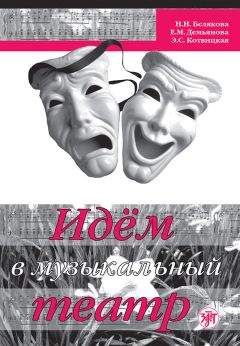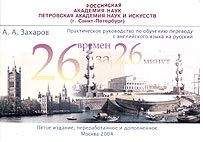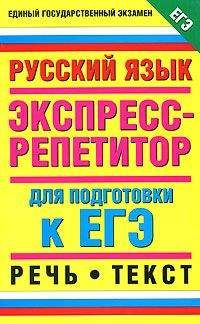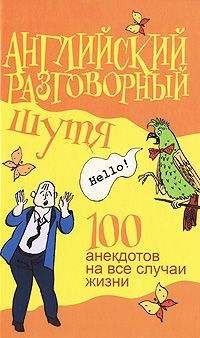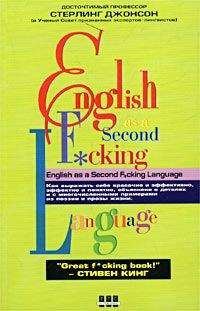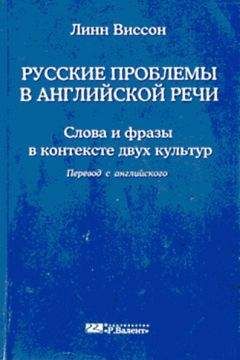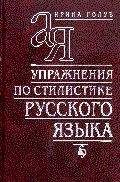Т. Шелкова - Can You Speak Over the Telephone. Как вести беседу по телефону

Скачивание начинается... Если скачивание не началось автоматически, пожалуйста нажмите на эту ссылку.
Жалоба
Напишите нам, и мы в срочном порядке примем меры.
Описание книги "Can You Speak Over the Telephone. Как вести беседу по телефону"
Описание и краткое содержание "Can You Speak Over the Telephone. Как вести беседу по телефону" читать бесплатно онлайн.
Ведение разговора по телефону на иностранном языке требует от обучающегося определенных навыков понимания, восприятия и удержания в памяти услышанного, а также незамедлительной словесной реакции на услышанное. Недостаточное развитие этих навыков является препятствием к тому, чтобы хорошо и уверенно говорить по телефону.
Пособие ставит своей целью помочь учащимся овладеть навыками беседы по телефону, пользоваться общепринятой терминологией.
Во второе издание (1-е — 1980 г.) внесены исправления редакционного характера.
Для лиц, самостоятельно совершенствующих свои знания английского языка.
IV. Convey congratulations by phone:
1. to your colleague who has been promoted; 2. to your counterpart who has got married; 3. to the director of the company on the successful completion of the project; the equipment for the project has been delivered by this company; 4. to your American friend who has become a father; 5. to your African colleagues on their National Holiday.
F. EXCHANGE OF OPINIONS
Mr Ross: Could I speak to Mr Frolov, please?
Mr Frolov: Speaking.
Mr Ross: Good morning, Mr Frolov. This is Ross. I work with the U.N. in the Development Programme[14].
Mr Frolov: That is my field, too.
Mr Ross: That’s why I am calling you, Mr Frolov.
Mr Frolov: Is there anything I can do for you?
Mr Ross: I read your articles on technical assistance and find them excellent.
Mr Frolov: They may seem a little obsolete, I am afraid. I wrote them some years ago.
Mr Ross: Well, the figures may be obsolete, but the general approach and the method of research are up-to-date. What is most interesting is the analysis of the economy you gave in your last article.
Mr Frolov: That is the article on the economic development of some East African countries, isn’t it? Are you an economist, Mr Ross?
Mr Ross: Yes, I am. My field is the influence of the U.N. technical assistance[15] upon the economic development of East African countries.
Mr Frolov: That is a very interesting but little known field. In what way, Mr Ross, do you think, I can help you?
Mr Ross: Mr Frolov, you are a specialist on the economic situation in Eastern Africa. Could you recommend me any literature on the subject?
Mr Frolov: Certainly, I can send you the bibliography on the problem.
Mr Ross: Will you send it to my U.N. address, please?
Mr Frolov: I will. Good-bye, Mr Ross.
Mr Ross: Thank you very much. Good-bye.
2. Discussing Arrangements
Mr Brenn: Could I speak to Mr Shilov, please?
Secretary: Who’s calling, please?
Mr Brenn: This is Tom Brenn of the Conference Department, United Nations.
Secretary: Wait a second, Mr Brenn. Here is Mr Shilov.
Mr Shilov: Hello, Mr Brenn. Has the Conference finished its work? I’m sorry I had to leave due to an urgent matter here in the Mission.
Mr Brenn: That’s all right, Mr Shilov. The Conference has adjourned till next Tuesday. The Chairman has asked you and me to prepare a draft resolution.
Mr Shilov: Has anyone else been included in the draft resolution group?
Mr Brenn: Only two of us, and a secretary.
Mr Shilov: I must say Mr Ovenov is an excellent chairman. I like the way he conducted the proceedings. He gave everyone a chance to speak and kept the discussion to the point.
Mr Brenn: It’s a pity you left. At the end he gave a very good summary of the first day’s work of the Conference.
Mr Shilov: I hope that all the participants of the Conference will make an effective contribution to the subject under consideration. See you tomorrow then.
Mr Brenn: Yes, 10 o’clock in the morning, at the Conference Hall. Goodbye, Mr Shilov.
Mr Shilov: Good-bye, Mr Brenn.
* * *
Mr Reid: Hello, can I speak to Mr Petrov, please?
Secretary: Who’s calling, please?
Mr Reid: This is Reid of the Foreign Office.
Secretary: Which Petrov would you like to talk to, Mr Reid? We have two Petrovs here — councillor Arcady Petrov and attache Leonid Petrov.
Mr Reid: Councillor Petrov, please.
Secretary: Mr Petrov is on the phone.
Mr Petrov: Hello, Mr Reid. I am glad you called me.
Mr Reid: How are you, Mr Petrov? I hope you are not too busy with the preparations for this forthcoming conference of ours?
Mr Petrov: I am fine, thank you. I have an appointment with you, you remember, to discuss the draft resolution of the conference.
Mr Reid: Of course, I do. It is this Friday, at 3 p.m. Did the Chairman of the Committee send you the draft?
Mr Petrov: Yes, he did, and his personal letter, too. He’s insisting on discussing the draft resolution by a narrow circle of diplomats first. I don’t know what he means mentioning “a narrow circle of diplomats”.
Mr Reid: Our delegation also received his personal letter, and, as a matter of fact, it surprised us a little. I wish he would tell us more explicitly what this “narrow circle of diplomats” will be dealing with.
Mr Petrov: You don’t mind, Mr Reid, if we discuss this problem along with the other questions this Friday, do you?
Mr Reid: No, I don’t. I’m looking forward to seeing you soon. Good-bye.
Mr Petrov: Good-bye, Mr Reid.
3. Going on Business Abroad
Mr Jones: Hello, Mr Sedov. What have you been up to since I saw you last?
Mr Sedov: Not much, I am afraid, Mr Jones. Just the usual routine work here in the Department of Technical Assistance. And how are you?
Mr Jones: I’m fine, thank you. I’ve heard from Sergeev that you are going to leave for Yugoslavia soon. Is that right?
Mr Sedov: Yes, it is. A group of engineers and technical advisers from the Department is supposed to visit that country.
Mr Jones: On any particular mission?
Mr Sedov: Yes, the Yugoslavs invited us to help them with the construction of modern highways.
Mr Jones: Then they may be in need of the great cranes and bulldozers our firm is producing.
Mr Sedov: Most probably. You should get in touch with the Assistant Director of the Department, and ask him for information and advice, Mr Jones.
Mr Jones: What’s his name?
Mr Sedov: Mr Souram of India.
Mr Jones: Do you have his telephone number?
Mr Sedov: Jot it down — 377-01-09.
Mr Jones: Thank you. When are you leaving for Yugoslavia?
Mr Sedov: Next Monday. You’d better get in touch with Mr Souram as soon as possible
4. Talking of Colleagues
Fred: Hello, Yuri. This is Fred.
Yuri: Hello, Fred. How are you?
Fred: Very busy. We’ve got a lot of work here with the documents.
Yuri: I know. It’s the usual thing with the Documents Office before the Assembly.
Fred: Do you know the news?
Yuri: No, what is it?
Fred: Can you imagine — Dorothy and John are engaged.
Yuri: Which John? The one working in the Conference Department?
Fred: That’s right. And Dorothy is with the Technical Assistance Department.
Yuri: When was the engagement announced?
Fred: A week ago.
Yuri: Have they set the day for the wedding?
Fred: No, not yet. But John says they will marry sometime in November or December. He says you’re on the guest list.
Yuri: Am I? Then I’ve got to think about a wedding present.
Fred: It’s too early yet. He will send you an invitation to the wedding party.
Yuri: And who is the best man?
Fred: Their choice fell on me because I’m a bachelor.
Yuri: Congratulations! They could not have chosen a better man. You are witty, bright and will keep them free from the little worries which usually crop up at the ceremony.
Fred: I’ll try to do my best; as the best man should do. See you at the office on Monday. Bye-bye.
Yuri: Bye-bye, Fred.
5. Talking of Studies
Fred: Hello, Yuri. This is Fred.
Yuri: Hello, Freddy, how are you?
Fred: Not very well, I’m afraid.
Yuri: What’s the matter? Somebody’s ill?
Fred: No, everybody’s fine. But I’m giving up. I certainly can’t learn Russian.
Yuri: Why are you upset? I think you’re making wonderful progress.
Fred: No, I’m not. I try and try but still cannot speak it well.
Yuri: Well, learning any language takes a lot of effort and time. But don’t give up. What if I help you? I have a very good textbook only recently brought from Moscow.
Fred: Thank you, Yuri. I’m sure your help will improve things.
Yuri: See you on Monday, Freddy. Good-bye.
Fred: Thanks again, Yuri. Good-bye.
6. Talking of Sports
Mr Serov: Mr Budd? Good afternoon. This is Serov speaking.
Mr Budd: Hello, Mr Serov. Nice to hear you. How’s everything?
Mr Serov: Fine, thank you. You know, this Friday our Dynamo team is playing against your Red Sox.
Mr Budd: Are they really? That’s great! They are my favourite teams and I don’t know who to root for.
Mr Serov: I have two tickets. Would you like to watch the match?
Mr Budd: Sure thing. This is the only chance, and I would not miss it. And what’s your favourite sport?
Mr Serov: It’s hard to say. I like soccer all right, but I think I like tennis better.
Mr Budd: Do you play much tennis?
Mr SeroV: Yes, quite a bit. How about a game sometime?
Mr Budd: No, thanks. I am strictly a spectator.
Mr Serov: So I’m sending you the tickets for the match and hope to see you on Tuesday.
Mr Budd: Thank you, Mr Serov. I’m looking forward to seeing you. Goodbye.
Mr Serov: Good-bye.
EXERCISES
I. Read these dialogues and reproduce them as close to the text as possible.
II. What would you say on the phone in reply to these remarks or questions?
1. I suppose, that if we weigh the “pros” and “cons” we can make a more equitable assessment of the proposal. 2. Mr Orlov, I think, made a pertinent remark during the debate. 3. If you take an overall view of things I’m sure you’ll change your opinion. 4. I like the way Peter conducted the proceedings. He kept all the discussion to the point. 5. I wouldn’t say that the speaker explicitly spelled out what he had in mind. 6. Mr Breddy is away from the office on sick leave. Is there any message? 7. I think he is making wonderful progress in English. 8. Your argument turned the scale in my favour in our dispute. 9. Why do you think, Mr Omar, the staff at your office is in constant state of flux?
III. In what situations would you say the following?
1. I don’t know which team to root for. 2. Their choice fell on me because I’m a bachelor. 3. Could you fix an alternative date for meeting? 4. I’ll leave the invitation as an open one until a little later. 5. We are anxious to make whatever arrangements are convenient to you for spending a day or two in visiting our factory. 6. Then I’ve got to think about a present. 7. This is the only outstanding question. It should be brought up again tomorrow. 8. This is a very persuasive argument. You should have mentioned it. 9. I’m terribly sorry. I can’t disturb him. He is in conference.
IV. Discuss over the phone with a friend of yours:
1. the film you have seen; 2. the book you have read; 3. the performance you have seen; 4. the conference you have attended; 5. the holiday you had in summer; 6. the invitation to a wedding party you have received; 7. your favourite sport; 8. the party you have been to.
Working in groups of two, read the two dialogues aloud.
Dialogue 1 Discussing the Ties Between the Congress and the State Department
After having an interesting tour around the Capitol, this seat of US legislation, a tourist group of foreign students surrounded their American guide, who is a member of the House Foreign Affairs Committee. They poured a forest of questions upon him.
Tourist A: We are foreigners, Sir, and do not know much either about the Congress or the State Department. Do you mind if we ask you some questions?
Guide: Of course not. Go ahead. What is it that you’d like to know?
Tourist B: Does the Congress take part in US foreign policy formulation?
Guide: Very much so. The US participation in world affairs since World War II has greatly expanded the role of the Congress in foreign policymaking.
Tourist C: We thought that this was the competence of the State Department.
Guide: This is what the foreigners usually think. The President is the central figure of American foreign policy, and the final responsibility is his.
Подписывайтесь на наши страницы в социальных сетях.
Будьте в курсе последних книжных новинок, комментируйте, обсуждайте. Мы ждём Вас!
Похожие книги на "Can You Speak Over the Telephone. Как вести беседу по телефону"
Книги похожие на "Can You Speak Over the Telephone. Как вести беседу по телефону" читать онлайн или скачать бесплатно полные версии.
Мы рекомендуем Вам зарегистрироваться либо войти на сайт под своим именем.
Отзывы о "Т. Шелкова - Can You Speak Over the Telephone. Как вести беседу по телефону"
Отзывы читателей о книге "Can You Speak Over the Telephone. Как вести беседу по телефону", комментарии и мнения людей о произведении.





